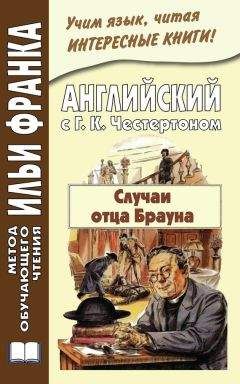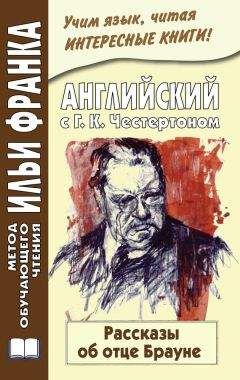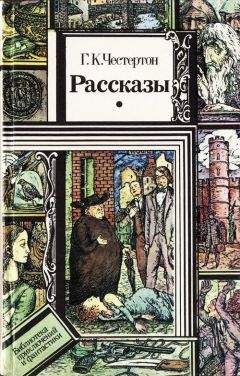“Reader of the books of evil, one more word before I blow away your baseless nightmares for ever. Not even faintly could you understand how little I care whether you can convict me or no. The things you call disgrace and horrible hanging are to me no more than an ogre in a child’s toy-book to a man once grown up. You said you were offering the speech for the defence. I care so little for the cloudland of this life that I will offer you the speech for the prosecution.
There is but one thing that can be said against me in this matter (в этом деле есть только одно, что может свидетельствовать против меня; to say – говорить; свидетельствовать), and I will say it myself (и я сам скажу, что это). The woman that is dead was my love and my bride (женщина, которая умерла, была моей возлюбленной и невестой; dead – мертвый); not after such manner as your tin chapels call lawful (не по тем обычаям, которые в ваших жестяных молельнях называют законными; manner – способ, метод; нравы, обычаи), but by a law purer and sterner than you will ever understand (но по закону, более безупречному и строгому, чем вы когда-либо /сможете/ понять; pure – чистый, беспримесный; непорочный, безупречный). She and I walked another world from yours (она и я = мы с нею ходили по иному миру, нежели ваш; to walk – ходить пешком), and trod palaces of crystal (и разгуливали /там/ по хрустальным дворцам; to tread – шагать, ступать) while you were plodding through tunnels and corridors of brick (в то время как вы бродили /здесь/ по туннелям и коридорам из кирпича; to plod – идти медленно, с трудом, тащиться).
There is but one thing that can be said against me in this matter, and I will say it myself. The woman that is dead was my love and my bride; not after such manner as your tin chapels call lawful, but by a law purer and sterner than you will ever understand. She and I walked another world from yours, and trod palaces of crystal while you were plodding through tunnels and corridors of brick.
Well, I know that policemen, theological and otherwise, always fancy (да, я знаю, что полицейские – и богословские и те, другие – всегда полагают; to fancy – воображать, представлять себе; думать, считать) that where there has been love there must soon be hatred (что, где существует любовь, то там должна быть и ненависть); so there you have the first point made for the prosecution (так что теперь у вас есть первый пункт для будущего обвинения: «сделанный для обвинения»). But the second point is stronger (но второй пункт еще серьезнее; strong – сильный; веский, серьезный); I do not grudge it you (я не стану скрывать его от вас; to grudge – жалеть, неохотно давать). Not only is it true that Pauline loved me (правда не только в том, что Полин любила меня), but it is also true that this very morning, before she died (но еще и в том, что этим самым утром, прежде чем умереть), she wrote at that table a will (она написала за этим вот столом завещание) leaving me and my new church half a million (оставив мне и моей новой церкви полмиллиона). Come, where are the handcuffs (ну, давайте, где же наручники)? Do you suppose I care what foolish things you do with me (неужели вы полагаете, меня заботит то, какую нелепую казнь вы мне придумаете: «какие глупые вещи вы сделаете со мной»)?
Well, I know that policemen, theological and otherwise, always fancy that where there has been love there must soon be hatred; so there you have the first point made for the prosecution. But the second point is stronger; I do not grudge it you. Not only is it true that Pauline loved me, but it is also true that this very morning, before she died, she wrote at that table a will leaving me and my new church half a million. Come, where are the handcuffs? Do you suppose I care what foolish things you do with me?
Penal servitude will only be like waiting for her at a wayside station (тюремное заключение окажется просто ожиданием ее на пригородной станции; penal – наказуемый /законом/; servitude – рабство; каторга; wayside station – промежуточная станция). The gallows will only be going to her in a headlong car (виселица станет только лишь поездкой к ней в бешено мчащемся поезде; headlong – головой вперед; очертя голову; car – автомобиль, машина; вагон).”
He spoke with the brain-shaking authority of an orator (он говорил с потрясающей убедительностью оратора; brain – мозг; to shake – трясти, сотрясать; authority – власть; компетенция), and Flambeau and Joan Stacey stared at him in amazed admiration (а Фламбо и Джоан Стэйси смотрели на него с изумлением и восхищением; to amaze – изумлять, поражать). Father Brown’s face seemed to express nothing but extreme distress (лицо отца Брауна, казалось, выражало одну лишь невыносимую душевную муку: «не выражало ничего, кроме чрезмерного страдания»); he looked at the ground with one wrinkle of pain across his forehead (он смотрел в пол: «в землю», и от душевной боли лоб его пересекла морщина).
Penal servitude will only be like waiting for her at a wayside station. The gallows will only be going to her in a headlong car.”
He spoke with the brain-shaking authority of an orator, and Flambeau and Joan Stacey stared at him in amazed admiration. Father Brown’s face seemed to express nothing but extreme distress; he looked at the ground with one wrinkle of pain across his forehead.
The prophet of the sun leaned easily against the mantelpiece and resumed (солнечный пророк легонько оперся о каминную полку и подвел итог):
“In a few words I have put before you the whole case against me (в нескольких словах я разложил перед вами все факты, /свидетельствующие/ против меня; case – случай; совокупность доказательств, аргументация) – the only possible case against me (единственно возможные факты против меня). In fewer words still I will blow it to pieces (и точно так же в нескольких словах я разнесу /обвинение/ в пух и прах; to blow to pieces – разбить на куски, вдребезги), so that not a trace of it remains (так что и следа от него не останется). As to whether I have committed this crime (а что до того, совершил ли я преступление), the truth is in one sentence (то истина заключается в одном предложении): I could not have committed this crime (я не мог совершить преступления). Pauline Stacey fell from this floor to the ground at five minutes past twelve (Полин Стэйси упала с этого этажа на первый в пять минут первого: «в пять минут после двенадцати»; to fall; ground floor – нижний, первый этаж /брит./).
The prophet of the sun leaned easily against the mantelpiece and resumed:
“In a few words I have put before you the whole case against me – the only possible case against me. In fewer words still I will blow it to pieces, so that not a trace of it remains. As to whether I have committed this crime, the truth is in one sentence: I could not have committed this crime. Pauline Stacey fell from this floor to the ground at five minutes past twelve.
A hundred people will go into the witness-box and say (сотня людей взойдет на свидетельскую трибуну и скажет) that I was standing out upon the balcony of my own rooms above (что я стоял на балконе своих собственных апартаментов наверху) from just before the stroke of noon to a quarter-past (с /того момента как часы/ пробили полдень до четверти первого: «до четверти после»; stroke – удар; бой часов) – the usual period of my public prayers (обычное время моих публичных молитв; period – период, промежуток времени). My clerk (a respectable youth from Clapham, with no sort of connection with me) will swear (мой клерк – приличный молодой человек из Клэпэма, никак со мною не связанный – поклянется/присягнет; respectable – заслуживающий уважения, почтенный; приличный; to respect – уважать, почитать; youth – юность; юноша, молодой человек; connection – связь, соединение) that he sat in my outer office all the morning (что он просидел в приемной: «во внешней конторе» все утро), and that no communication passed through (и никто не проходил мимо /него/; communication – сообщение, связь).
A hundred people will go into the witness-box and say that I was standing out upon the balcony of my own rooms above from just before the stroke of noon to a quarter-past – the usual period of my public prayers. My clerk (a respectable youth from Clapham, with no sort of connection with me) will swear that he sat in my outer office all the morning, and that no communication passed through.
He will swear that I arrived a full ten minutes before the hour (он присягнет, что я появился в конторе как минимум без десяти двенадцать: «прибыл за целых десять минут до того часа»), fifteen minutes before any whisper of the accident (за пятнадцать минут до того, как поползли первые слухи о случившемся; whisper – шепот; молва, слушок; accident – несчастный случай), and that I did not leave the office or the balcony all that time (и что я не покидал ни контору, ни балкон все это время). No one ever had so complete an alibi (такого полного алиби /еще/ ни у кого не было); I could subpoena half Westminster (я мог бы вызвать на свидетельское место пол-Вестминстера; to subpoena – вызывать в суд повесткой). I think you had better put the handcuffs away again (думаю, вам лучше снова отложить наручники). The case is at an end (дело закончено; to be at an end – заканчиваться, подходить к концу).
But last of all, that no breath of this idiotic suspicion remain in the air (но напоследок, чтобы и дух этого идиотского подозрения не витал: «не остался» в воздухе; last of all – в последнюю очередь; breath – дыхание; дуновение), I will tell you all you want to know (я скажу вам все, что вы хотите знать).
He will swear that I arrived a full ten minutes before the hour, fifteen minutes before any whisper of the accident, and that I did not leave the office or the balcony all that time. No one ever had so complete an alibi; I could subpoena half Westminster. I think you had better put the handcuffs away again. The case is at an end.
But last of all, that no breath of this idiotic suspicion remain in the air, I will tell you all you want to know.
I believe I do know how my unhappy friend came by her death (мне кажется, я знаю, как моя несчастная подруга нашла свою смерть; to believe – верить; думать, полагать; to come by – достигать, достичь). You can, if you choose, blame me for it (вы можете, если хотите, обвинить меня в этом; to choose – выбирать; хотеть, желать /разг./), or my faith and philosophy at least (или, по крайней мере, мою веру и философию); but you certainly cannot lock me up (но, вы, конечно же, не сможете /за это/ упрятать меня за решетку; to lock up – запереть; посадить в тюрьму). It is well known to all students of the higher truths (всем, кто изучает высшие истины, хорошо известно; student – студент, учащийся; изучающий /что-л./) that certain adepts and illuminati have in history attained the power of levitation (что в истории /были случаи,/ когда некоторые магистры и просветленные приобретали способность к левитации; certain – определенный, точный; некоторый, определенного рода; adept – знаток, эксперт; illuminati /лат./ – просвещенные; to attain – добиваться, достигать; получать, приобретать; power – сила, мощь; способность, возможность) – that is, of being self-sustained upon the empty air (что является умением держаться в пустом воздухе; to sustain – поддерживать, подпирать).




